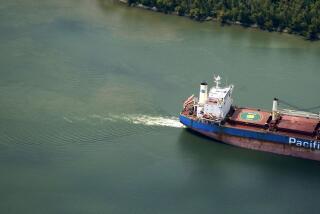Lake Okeechobee’s declining water level strains south Florida’s water supply
- Share via
Reporting from Fort Lauderdale, Fla. — Lake Okeechobee’s declining water level once again threatens to generate water-supply ripple effects throughout south Florida, leaving less water for thirsty crops and lawns as well as an ecosystem trying to rebound from years of abuse.
The big lake is south Florida’s backup water supply, relied on to replenish drinking water for some communities and tapped for irrigation by sugar cane growers and other farmers.
During droughts, the lake also is a barometer for water conditions across the region. Low lake levels are one of the big factors that can result in emergency watering restrictions across south Florida.
The South Florida Water Management District projects that by the end of January the lake could drop low enough to trigger tougher restrictions. Those emergency measures would start with farms and towns immediately south of Lake Okeechobee and, if drought conditions worsen, spread to the rest of south Florida.
“Hold on tight. This summer is not going to be pretty,” said Carol Wehle, executive director of the water management district. “We are just going to have a horrible drought unless something changes.”
On Monday, Lake Okeechobee measured 12.46 feet above sea level. That was about a foot lower than this time last year and more than 2 feet below average.
South Florida remains in the midst of its winter and spring dry season. The last three months turned out to be the driest October-to-December span in nearly 80 years, with an average of 2.97 inches of rainfall from Orlando to the Florida Keys.
If the lake drops below 10.5 feet, it’s too low for gravity to fill the drainage canals that send lake water south to supplement irrigation for hundreds of thousands of acres of sugar cane, vegetables and other crops in the Everglades Agricultural Area.
That would prompt the water district to use temporary pumps to keep lake water flowing south.
But those pumps aren’t capable of delivering the usual allotment of water relied on to boost crops.
Growers already are expecting temporary watering restrictions that could start this month if lake levels keep dropping.
More to Read
Sign up for Essential California
The most important California stories and recommendations in your inbox every morning.
You may occasionally receive promotional content from the Los Angeles Times.










